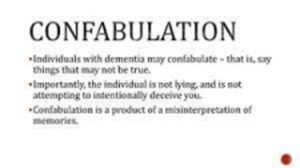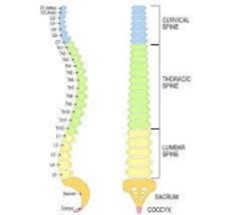A nurse is caring for an older adult client who has dementia and handles anxiety by confabulating. The nurse should recognize which of the following as confabulation?
A makes up stories when he is unable to remember actual events.
B reminisces about the past.
C displays compulsive and ritualistic behaviors.
D refuses to leave home to see a provider.
The Correct Answer is A
Choice A Rationale: A person who makes up stories when he is unable to remember actual events is confabulating. This can be seen as a way of filling in the blanks in their memory with plausible details that may or may not have happened. For example, a person with dementia may confabulate that they had lunch with a friend yesterday, when in fact they did not see anyone.
Choice B Rationale: reminiscing about the past, which is a normal and healthy way of recalling one's life experiences and sharing them with others.
Choice C Rationale: displaying compulsive and ritualistic behaviors, which are repetitive actions that a person feels compelled to perform, often as a way of reducing anxiety or distress.
Choice D Rationale: refusing to leave home to see a provider, which is a sign of agoraphobia, a fear of being in situations where escape might be difficult or embarrassing.

Nursing Test Bank
Naxlex Comprehensive Predictor Exams
Related Questions
Correct Answer is A
Explanation
Choice A Rationale: The patient who developed a new cough after eating breakfast should be seen first. This sudden change in respiratory status during or after eating suggests a potential risk of aspiration, which requires immediate assessment and intervention to prevent respiratory distress or pneumonia.
Choice B Rationale: Medication refusal, while important, is not an immediate life threatening issue compared to a new cough with the potential for aspiration.
Choice C Rationale: Although constipation can be uncomfortable, it is not an acute priority compared to a new cough that may indicate a respiratory problem.
Choice D Rationale: A stage II pressure ulcer on the coccyx, while concerning, is not an immediate priority over a potential respiratory issue that requires urgent attention.
Correct Answer is C
Explanation
Choice A Rationale: Quadriplegia is a type of paralysis that affects all four limbs and the trunk, usually caused by an injury to the cervical spine (C1-C8).
Choice B Rationale: Incomplete loss of function refers to the extent of injury and whether some neurological function remains, not the level of injury.
Choice C Rationale: CA injury refers to cervical spine injury, which is the most common level of spinal cord injury.
Choice D Rationale: Hyperextension, like other mechanisms of injury (such as compression, flexion, or flexion-rotation), can contribute to spinal cord injury but does not define the level of injury.

Whether you are a student looking to ace your exams or a practicing nurse seeking to enhance your expertise , our nursing education contents will empower you with the confidence and competence to make a difference in the lives of patients and become a respected leader in the healthcare field.
Visit Naxlex, invest in your future and unlock endless possibilities with our unparalleled nursing education contents today
Report Wrong Answer on the Current Question
Do you disagree with the answer? If yes, what is your expected answer? Explain.
Kindly be descriptive with the issue you are facing.
